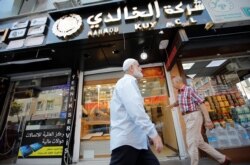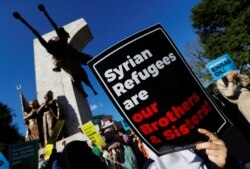An international human rights group is accusing Turkey of forcibly deporting Syrians to their war-torn country. Ankara denies the accusation but is defending its ongoing crackdown on unregistered refugees.
"Turkey claims it helps Syrians voluntarily return to their country, but threatening to lock them up until they agree to return, forcing them to sign forms, and dumping them in a war zone is neither voluntary nor legal," said Gerry Simpson, associate emergencies director of New York-based Human Rights Watch.
Turkish Interior Minister Suleyman Soylu maintains that all returning refugees have done so "voluntarily." "When we catch Syrians who are not registered, we send them to refugee camps," he said, citing a camp in the Turkish border province of Hatay.
Soylu is vigorously defending the ongoing crackdown, launched this month on unregistered Syrians living in Istanbul. Since the start of the civil war, local media report as many as one million Syrians have sought sanctuary in Turkey's largest city. Officially, 500,000 are permitted to live in the city.
Police are now carrying out identification checks in areas where large numbers of Syrians live and work. In Istanbul's Aksaray district, dubbed locally "little Damascus" because of its numerous Syrian businesses and restaurants, police have stepped up their presence.
"Now they're applying laws. It [ID checks] didn't happen before," said one Syrian, who declined to be identified. "I don't know much about the mentality of the state, but it is not right at all to deport people. Syrians are under temporary protection here. They can't be sent to a country in war. You can't deny that there is a war there. They're being deported to war."
'Open door' policy
Turkey officially hosts 3.6 million Syrian refugees, of which the overwhelming majority live in towns and cities across the country. Since the start of the civil war, Ankara has had an "open door" policy regarding the refugees.
Syrians fleeing the conflict are not designated refugees but granted temporary residence status. That designation gives them access to state education and medical care, and allows them to start businesses.
Turkish President Recep Tayyip Erdogan, who strongly backs the Syrian rebels, until recently strongly defended his policy, routinely boasting of the more than $30 billion spent hosting the refugees.
'Massive problem'
But amid growing public discontent over the policy, Erdogan and his government stance appear to be changing.
A recent opinion poll found that more than 80% of Turks want the Syrians to leave. Another survey found that only 7% were happy with their presence.
"The Turkish public is overwhelmed because low-qualification jobs are rapidly moving to Syrians. Turkey's health and education facilities are already overwhelmed," said analyst Atilla Yesilada of Global Source Partners.
"It's becoming a massive problem," he added, "and Erdogan's staunch advocacy of keeping the Syrian refugees was one of the reasons for losing Istanbul [in the June mayoral election]. But Mr. Erdogan finally got the message, and the crackdown on 'undocumented Syrians' has finally started in Istanbul."
The opposition CHP's landslide victory in Istanbul's mayoral election in June is widely seen as Erdogan's most significant electoral defeat, ending his party's decades-long dominance of the city. During the campaign, Ekrem Imamoglu, who is the city's new mayor, sharply criticized Erdogan's policy on Syrians.
Social tensions
A potentially more pressing concern for Erdogan is fear of rising social tensions. In June, a Turkish mob attacked Syrians and their shops in an Istanbul suburb. Unsubstantiated claims on social media that Syrians had attacked a young woman triggered the violence.
There has been a surge in anti-Syrian sentiment across Turkish social media. The hashtag telling Syrians to "get out" has seen a revival.
On Saturday, Turkish nationalists tried to break up a demonstration in support of Syrian refugees in central Istanbul. An economic recession is exacerbating tensions, with unemployment approaching record highs, at more than 16%.
Analyst Aydin Selcen says what is remarkable is the lack of confrontation. "As a country hosting 4 million Syrians in economic crisis, without any serious incident against these people, for all this Turkey as a country should be congratulated," Selcen said.
"But definitely the people have a limit," he added. "One cannot know if violence [against Syrians] will flare up all of a sudden, or it will take time, or it maybe will never happen; maybe there will be a digestion period. But it's a risk. Also, these Syrians, their aim is not to stay here, they try to move on, toward Europe but they cannot, and they cannot go back, so they are stuck here."
Erdogan is ramping up his rhetoric against Europe for failing to share the refugee burden while the Turkish military is poised to intervene into Syria against a Kurdish militia it designates as a terrorist group.
Ankara says it plans to create a 40-kilometer deep zone to secure its border, but the territory would allow Syrians to return. Observers have questioned whether Syrians living in Turkey for years are ready to go home to a war-torn country and an uncertain future.







